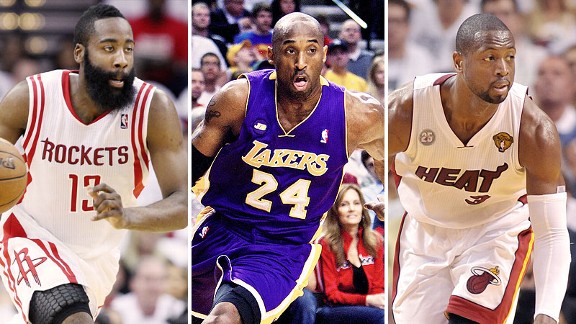 |
| (Courtesy of ESPN.com) |
After Michael Jordan retired for the final time following his sixth championship in 1998, the league needed a new star shooting guard to step up and assume the mantle. Interestingly enough, one could argue that the post-Jordan era began while he was still playing. The 1996 draft class is widely regarded as one of the best in NBA history, and marked the arrival of the first wave of potential Jordan-esque shooting guards. The star studded draft resulted in Allen Iverson (1st overall pick) going to the Philadelphia 76ers, Ray Allen (5th overall) going to the Milwaukee Bucks via trade with the Minnesota Timberwolves, and Kobe Bryant (13th overall) going to the Los Angeles Lakers via trade with the Charlotte Hornets. These three in particular possessed the right blend of scoring acumen and athleticism to potentially challenge for the next great player NBA. Later drafts would continue to bring an influx of talent at the off-guard position.
The 1997 draft class saw Tracy McGrady (9th overall) fall into the lap of the Toronto Raptors where he would show glimpses of brilliances, but it would not be until he was traded to the Orlando Magic before the 2000-2001 season where he would display his otherworldly scoring ability along with his all-around skills. McGrady's cousin Vince Carter (6th overall, via trade with the Golden State Warriors) would be drafted by the Toronto Raptors during the 1998 NBA draft where he brought his penchant for athletic scoring drives and breathtaking aerial assaults on the rim, which were reminiscent of Jordan himself. Carter and McGrady along with Iverson, Allen, and Bryant represented the pinnacle of the shooting guard position during the late 1990s and early 2000s in the NBA. Even second tier stars such as Manu Ginobili (1999 draft, 57th overall), Jamal Crawford (2000 draft, 8th overall), Michael Redd (2000 draft, 43rd overall), and Jason Richardson (2001 draft, 5th overall) contributed to an increasingly deep talent pool at the position. The league was primed for this group of talented, high-scoring shooting guards to usher in a new era of perimeter dominance in the NBA, that is, until the draft class of 2003 came along.
Known as perhaps one of the most star studded draft classes in NBA history, the 2003 draft produced the likes of LeBron James, Carmelo Anthony, Dwyane Wade, and Chris Bosh. Later drafts also brought other superstars into the league such as Dwight Howard (2004 draft, 1st overall), Deron Williams (2005 draft, 3rd overall), Chris Paul (2005 draft, 4th overall), Kevin Durant (2007 draft, 2nd overall), Derrick Rose (2008 draft, 1st overall), Russell Westbrook (2008 draft, 4th overall), Blake Griffin (2009 draft, 1st overall), James Harden (2009 draft, 3rd overall) and Paul George (2010 draft, 10th overall). High scoring shooting guards were still a prominent part of the league, but they would gradually be phased out with the arrival of the 2003 draft class. This new era of superstars can certainly score, but their true strength lies with their versatility.
Players who can effortlessly play multiple positions are a hot commodity in the NBA. The centerpieces of most teams are versatile players capable of manning different positions on the court. Additionally, there has been a greater emphasis placed on a player's efficiency on offense and defense. Advanced statistics such as PER (Player Efficiency Rating), which takes into account a player's production by the minute are being utilized by teams to evaluate just how much of an impact on the court certain players have, outside of just how many points they score. The dynamic of the league has begun to shift and favor players who are more versatile and efficient, rather than those who merely score a ton but fail to contribute in other aspects and unfortunately, most shooting guards from the late 1990s and early 2000s were the latter. Inefficient, volume shooting guards are no longer viewed as franchise players, in fact, only three individuals can be considered as cornerstone players at that position.
James Harden, Dwyane Wade, and Kobe Bryant can score with the best in the league, but it is their efficiency that sets them apart. Harden was a picky shooter when he came off the bench for the Oklahoma City Thunder, but when he was traded to the Houston Rockets and pushed into a more featured role, he maintained his efficiency with an increase in shot attempts. Harden tends to hunt for three pointers or use his clever dribble drive ability to get shots at the rim, widely considered by basketball pundits as the most efficient shots a player can take. For the Wade, his efficiency does not lie with three pointers, but relentless attacks in the painted area towards the basket. Long range shooting has never been his strength, so Wade usually scores with drives to the rim. Kobe Bryant has established his reputation as one of the greatest scorers in NBA history, but he has never been a very efficient shooter, so he makes up for that with his versatility. Bryant can play and defend all three perimeter positions which has made him a valuable part of the Los Angeles Lakers since he was drafted in 1996. Bryant, Wade, and Harden make up the creme of crop when it comes to the contemporary shooting guard and the next wave of players will undoubtedly follow in their footsteps.




